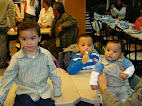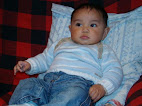For relationships to be successful there should be effective communication could only occur between two persons when the receiver could be able to encode correctly the information sent by the sender.
To be able to do this there are two conditions that should be met; first, the language used by both should be the same; second, there should be no barriers between the two persons. This same principle is also applicable when your child talks to you.
To understand the concept better, listed below are explanations of the two conditions.
1. You should use the same language as your child.
This means that the parent is familiar with the child's lingo, diction and accent. As parent, you should be aware of the words that your child uses. As your child learns how to speak, he would be acquiring his own style of speaking. There are particular words that your child may not be able to pronounce well.
You should be aware of these words.
2. There should be no barrier between the sender (child) and the receiver (you). What are the common barriers in communication that could occur between you and your child?
2.1.1. When your child talks to you, be sure that both of you are facing each other. When you cannot see the facial expression and non-verbal cues of your child, you would not understand clearly what he wants to say. The inability to observe his non-verbal cues is a barrier to effective communication.
2.1.2. Give your full attention when he is talking. Being preoccupied with something else is one barrier to successful communication. How could you understand fully what he says when you are thinking of something else? Listen to every word he says; look and concentrate.
2.1.3. Interrupting him while he is talking is an indication that you're not interested to listen to what he has to say. This would discourage him to speak his mind. Allow him to talk until he is done. Prod him to talk more.
2.1.4. Not asking enough questions is also a barrier. Ask him encouraging questions to learn more of what he wants to communicate. Leading questions could make you understand him completely. Examples are: "You said that you can't find your dog, did you look in the garden?" etc.
2.1.5. Be approachable. How many children hesitated to talk to their parents because they were "afraid"? He would talk to you in monosyllables if you are aloof. If you want your child to talk to you like he should, then show him that he can talk to you without being censored. Being distant from your child would not help you surely in understanding him.
The above-mentioned observations; however, would not be effective unless you empathize with your child. Understanding him means you feel what he feels too. In the end, it is the love you have for your child which would pave the way for you to truly understand what he is saying. Listening to your child is the real secret in understanding him/her.
Whose Responsibility is it to Monitor Children's TV Viewing?
-
Being a community of people means there should be a concerted effort from
everyone concerned to solve the problem.
The parents foremost, the school, the co...
13 years ago











































0 comments:
Post a Comment